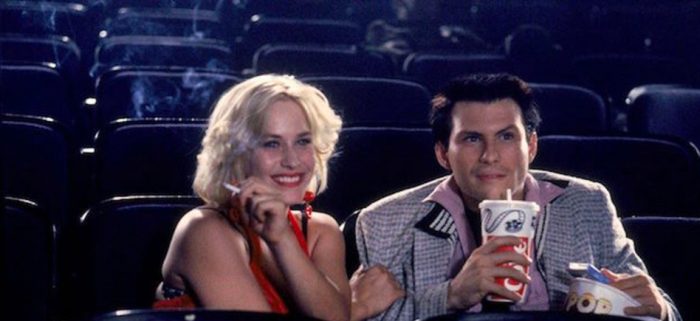Quentin Tarantino Reveals 'Maniac' Filmmaker William Lustig Almost Directed 'True Romance'
After the 1992 release of Reservoir Dogs, Quentin Tarantino was fast on his way to becoming a big deal. And while his next directorial effort, Pulp Fiction, wouldn't arrive until 1994, 1993 was also a big year for Tarantino – because that was the year of True Romance. It was technically Tarantino's first screenplay, written before Reservoir Dogs, and while he considered directing it himself, he eventually sold the script.
The script was then directed by the late, great Tony Scott, and the resulting film was flashy, nasty, violent, and pretty damn good. But the movie could've turned out very differently. In a new interview, Tarantino reveals that before Tony Scott got involved, William Lustig, helmer of trashy cult gems like Maniac and Maniac Cop, came very close to directing True Romance.
True Romance isn't technically a Quentin Tarantino movie, but it has that distinct Tarantino vibe. Tarantino himself has called it one of his most autobiographical screenplays, and you can see the seeds of his future work planted within the frames. But the director of True Romance was Tony Scott, a filmmaker I dearly miss. Scott did a great job with Tarantino's script, crafting a fast-paced saga of lovers on the run – but according to Tarantino himself, things could've worked out a lot differently.
Speaking with Deadline, Tarantino reveals that William Lustig, director of Maniac, Maniac Cop, and more, came very close to directing. "How I eventually got into the industry to some degree was, my friend Scott Spiegel was going to write something for the director, William Lustig, who did Maniac, Maniac Cop. He wanted to bring me in to help him, and Lustig looked at me and said, 'Who is this fucking guy?' And so, he gave them my script for True Romance, just as an audition piece," Tarantino says. "He read it, and he really, really liked it and couldn't quite get it out of his head. He had a deal with Cinetel at the time, and so he showed it to the people there and bought it. They were going to make it, with William Lustig."
Enter Tony Scott
William Lustig probably isn't as good a filmmaker as Tony Scott, but I'd be lying if I said I didn't want to see Lustig direct a Tarantino script. They both share the same sort of trashy, B-movie mentality that would pair nicely. But in the end, I do think Scott was the right man for the job. As Tarantino tells, a friend of Scott's turned him onto the script. "The woman who was the head of development at Cinetel, Caitlin Knell — who really helped me out in getting started in my career — she was really good friends with Tony Scott because she used to be his assistant," he says. "She knew I was a big fan of his. So she invited me to the set of The Last Boy Scout, and I was able to watch filming for a little bit, and she took me to Tony's birthday party. I was in heaven. I was only just a year out of the video store. And apparently, I made such a nice impression on Tony that he was like, 'Who is this kid?' She said, 'The boy's a really good writer, I'm working with him on this thing at Cinetel.' And he goes, 'Well, send me a couple of his scripts. Let me read them. He seems like a nice guy. I mean, he really likes me, so he's obviously got good taste. Send me a couple of his scripts.'"
As it turns out, Scott wanted to direct a different Tarantino script – Reservoir Dogs. But Tarantino wanted that for himself. "She sent him True Romance and Reservoir Dogs. He read them, and he called Cat in a month and goes, 'I want to make it. I want to make Reservoir Dogs. Let's do it right now,'" Tarantino says. "She was, 'Well, OK. That one he won't give you. That one he looks like he could make himself.' Tony says, 'OK, OK, I'll do the other one.' And then it became a situation where Cinetel was going to make it, but then Tony wanted to make it. I go, 'Well, get it away from Cinetel, or pay them off or whatever or make it for them.' He said, 'OK,' and that's how it happened."
The rest is cinema history. Scott also even improved on the script. Tarantino's original ending was much darker, with the main characters dying. "I just fell in love with these two characters and didn't want to see them die. I wanted them together," Scott said in an interview back in 2008. Tarantino agreed, saying in the same interview: "When I watched the movie, I realized that Tony was right. He always saw it as a fairy tale love story, and in that capacity it works magnificently."

